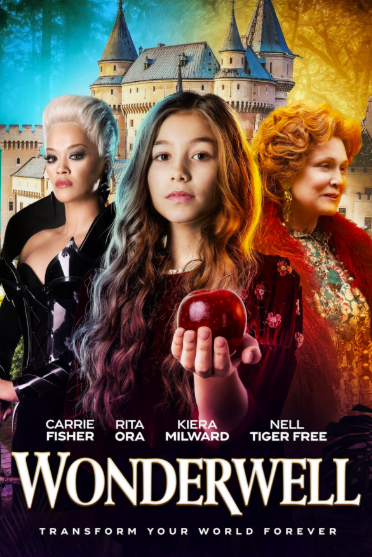1. Plot Summary
Wonderwell is an Italian-American fantasy drama directed by Vlad Marsavin, based on William Brookfield’s short story Drainhole Dreaming.
Violet (Kiera Milward), a curious 12-year-old girl, lives with her family in Italy. When her older sister Savannah is chosen to model for Yana’s fashion label, the family travels to a medieval village for a photoshoot. Feeling neglected and restless, Violet wanders into a forest where she encounters Hazel (Carrie Fisher), a mysterious witch. Hazel offers Violet access to a magical realm via a portal. Within this realm, Violet must confront magical trials, hidden dangers, and a confrontation with Yana (Rita Ora), who harbors magical ambitions of her own. Over the course of the journey, Violet’s relationships, identity, and the boundaries between childhood and maturity are tested.
2. Notable Elements
Strengths / What Stands Out
- Carrie Fisher’s presence: Hazel is one of the more coherent characters. While Fisher’s screen time is limited, many reviewers note that whenever she appears, the film feels more grounded and magical.
- Visuals / setting / cinematography: Shot partly in Tuscany and ancient Italian towns, the physical settings and landscapes lend natural beauty and a fairy-tale texture to the film.
- Fantasy imagery: The film employs magical elements like moving flowers, giant venus flytraps, portals, and enchanted gardens to evoke wonder.
- Ambitious mythic structure: The narrative attempts to blend coming-of-age, family dynamics, and fantasy lore. Hazel and Yana’s relationship is mirrored in Violet and her sister’s relationship, giving the story a layered structure.
Weaknesses / What Doesn’t Work As Well
- Confusing / under-explained world rules: Multiple reviews note the film fails to clarify how magic works, how rules operate, or why certain transformations happen.
- Uneven performances & character depth: Some actors are seen as underutilized; characters other than Violet and Hazel are less developed. Rita Ora’s Yana is often criticized as seeming shallow or villainous without sufficient explanation.
- Pacing & narrative flow: Critics argue the film sometimes drifts, with subplots that don’t resolve; transitions between the “real world” and the magical realm feel abrupt or undercut suspense.
- Tone & coherence: Some see the film as more a collection of images and fantasy vignettes than a tightly plotted story. The Guardian calls it “a rather limp, confusing little fantasy.”
3. Themes and Messages
- Coming of age / transition: Violet’s journey across a magical portal is symbolic of moving from childishness toward adolescence, with responsibilities, fears, and identity shifts.
- Neglect, family, and longing: Violet feels overshadowed by her sister’s modeling, and the film explores how parental attention, sibling rivalry, and familial expectations shape her inner life.
- Power, ambition, and corruption: Yana’s use of fashion and magic parallels how external beauty, status, and desire for power can mask darker motives.
- Belief vs skepticism: The film asks whether magic is real or metaphor, how much we believe in the unseen, and what we lose when we dismiss wonder.
- Balance between fantasy & reality: The boundaries blur, suggesting that imagination and reality inform each other, but also that one must return from fantasy to live responsibly.
Regarding holiday or festive sentiments: Wonderwell is not a film about celebrations or holidays. But its themes of family, growth, belief, and sacrifice can resonate with the reflective, hopeful mood of many holiday films. The idea of reconnecting with what matters—home, family, identity—echoes many festive stories.
4. Personal Impressions
What I liked:
- I appreciated the visual ambition: the settings, magical elements, and fantasy visuals often evoke a real sense of wonder.
- Violet is a sympathetic, curious lead; her vulnerabilities and desires are relatable.
- Hazel’s presence and Fisher’s aura add emotional weight; those scenes often feel more alive.
- The mirrored relationships (Hazel/Yana and Violet/Savannah) are interesting structural choices.
What I felt less strong:
- The lack of clear rules made parts of the story feel arbitrary; I found myself asking why things happened.
- I wanted more emotional grounding for secondary characters—so when they suffer or betray, it hits less.
- Some seem to argue the shift in tone (from gentle fantasy to darker motifs) is uneven.
- The ending leaves questions; viewers who prefer closure may find it frustrating.
5. Audience Recommendations
Who is likely to enjoy it:
- Fans of fairy-tale / magical realism / fantasy films who are tolerant of ambiguity.
- Viewers who appreciate visual, dreamy films more than tight narrative logic.
- People interested in Carrie Fisher’s final performance will find value in the film for that alone.
- Viewers interested in coming-of-age films with a fantasy bend.
Who may struggle:
- If you require clear worldbuilding and logical consistency, parts of Wonderwell may disappoint.
- Viewers who prefer strongly developed character arcs for all major characters.
- Audiences wanting straightforward fantasy rather than lyrical or metaphorical storytelling.
6. Conclusion & Rating
Wonderwell is an ambitious fantasy that partially succeeds in invoking magic and metaphor, but its lack of clarity and uneven execution hold it back. The film is worth watching for the imagery, the emotional resonance in Violet’s journey, and Carrie Fisher’s final screen role—but don’t expect a fully satisfying or self-contained narrative.
Final Recommendation: Watch if you’re open to a dreamy, symbolic fantasy and want to see Fisher’s final film; temper expectations of full narrative clarity.
⭐ Rating: 2.5 / 5 stars
Watch more:




